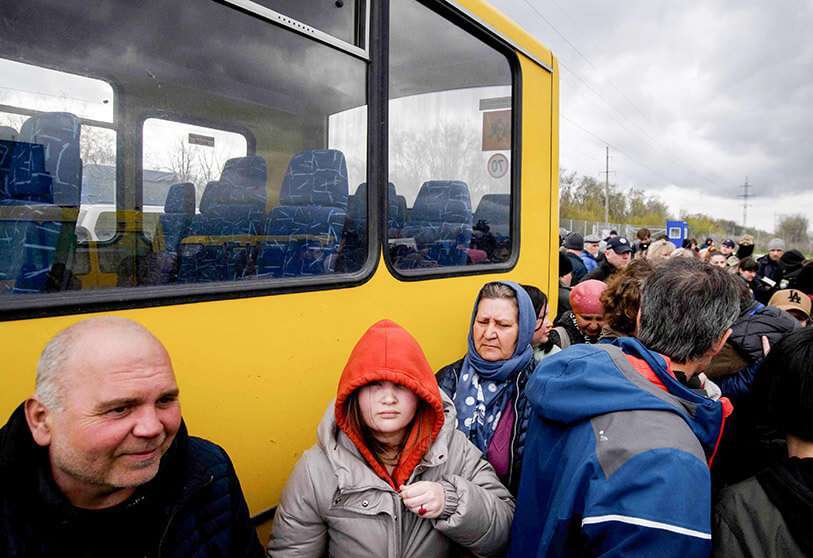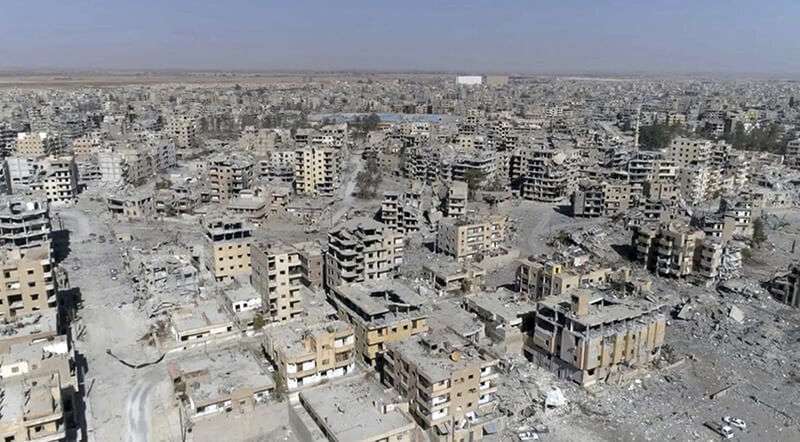The geopolitical situation in the Middle East after Russia's invasion of Ukraine

Europe is the scene of one of the most momentous wars in almost 80 years. For the past two months, Ukraine has been suffering a military invasion by Russia that has already claimed the lives of 3,238 civilians, including 277 children. In addition to the damage and loss of life, the country has suffered severe material and economic damage since the beginning of the invasion, a situation that has led Ukraine into a state of destruction that will take years to repair.
Although the international focus is now on Ukraine, it is necessary to stress that this war does not only affect Europe. The multilateral and multipolar context in which we find ourselves means that, for better and for worse, conflicts take on a global character and develop in a sort of domino effect that affects all continents to a greater or lesser extent.

The Middle East is a case in point. Specifically, Syria, a country that has suffered a bloody civil war that lasted for ten years, has witnessed how international interests are capable of being contested anywhere in the world. Thus, Syria has been and continues to be an international chessboard where the interests of the United States clashed with those of Russia, giving rise to a conflict in which not only regional interests were at stake, but also where international powers vied for influence and indirect control of the area.
In the invasion of Ukraine, Russian President Vladimir Putin himself reported that Russia would seek troops from the region to carry out the offensives. After Putin's support for Bashar al-Assad's army during the civil conflict, the latter has been able to build up its presence, enacting important political and commercial alliances with both Syria and other countries in the region.

According to Russian Defence Minister Sergei Lavrov, a total of 16,000 volunteers from the Middle East region showed their willingness to support Russian troops. This situation has been reversed eight years after the Russians took part in a military operation in support of the Syrian dictator, the first international military operation by the Russians since the fall of the Soviet Union.
Russia sent both planes and troops into Syria, launching one of the bloodiest campaigns against the population. Aleppo was one of the cities that were completely reduced to rubble and where alleged "war crimes" were denounced.
Now, just a few years later, this scenario has been repeated on European soil, including disputes between international powers. According to Jennifer Cafarella, chief of staff at the Institute for the Study of War and visiting fellow at the US National Security Institute, "Syria was Russia's war school for invading Ukraine".

However, a distinction needs to be made between the Syrian conflict and Ukraine. The first and most notable is that the Russian military entered Syria to support the Al-Assad regime, providing air support and units. In this country, the Russians supported a war effort unlike what is happening now with Ukraine.
In this vein, Russia has launched an unprecedented large-scale invasion in Ukraine. This operation, much more complex than the one Russia carried out in Syria, has demonstrated Moscow's desire to annex part of a territory that the former Soviet Union considers its own after Russia has been seriously threatened by the rapid expansion of NATO bases to enclaves very close to Russia's borders.
Although the context of warfare is different, there are some similarities in the way they operate militarily. The use of air strikes, artillery and missiles against civilian areas in an attempt to terrorise the population is one of the same destructive tactics that Russia employed in Syria.

Likewise, the negotiating tables that have been initiated in Ukraine are along the same lines as those executed in Syria. In both countries the Russians have offered humanitarian concessions, such as the opening of corridors, only to violate them, using the time they gain during negotiations to reinforce their troops.
It should be noted that Russia's presence and influence in Syria is still very much alive. Al-Assad is an important ally of the Kremlin and this gives Putin an ally in an influential part of the Middle East. For Russia, the Syrian trump card was a bid for global power. In this sense, Russia's presence also poses a threat to regional countries.
In the case of Turkey, the former Ottoman power has decided to close its airspace to both military and civilian flights from Russia. In addition, Turkey is trying to play an influential role at the negotiating tables between Russia and Ukraine. Given that Turkey is a NATO member, this is a noteworthy gesture, which is a sign of Erdogan's ambitions to gain influence and become a necessary country for diplomacy.

After the invasion began, Turkish President Recep Tayyip Erdogan called the move "a serious blow to peace and regional stability", a statement that came as a surprise given the closeness between Erdogan and Putin. The two leaders have supported each other thanks to several points in common, such as authoritarian tendencies and an "iron fist" against their enemies, which has led them both to forge close commercial ties.
However, Turkey does not want to gain Europe's distrust, and this makes its stance on the Ukrainian invasion harsher and more critical than expected. In addition, Turkey has its own internal military operations. Turkey's long-standing enmity with the Kurds is evidence of this. For Erdogan, members of the Kurdistan Workers' Party (PKK) are terrorists, which is why the country launched one of its toughest military operations against them less than a month ago.
For their part, the Kurds are trying to control the Kurdistan regions, which include parts of Iraq, Turkey, Syria and Iran, areas that have not been internationally recognised.

In this struggle to try to keep the project of a Kurdistan alive, the Kurds continue to fight battles against the Turks, who seek to take over the territories they control. This is where Syria comes in. Bastions in northern Syria, where Kurdish resistance continues to exist, as well as some jihadist cells, have become the main sites of confrontation between the Turks and the Kurds, sites where human rights violations allegedly perpetrated by Turkey have also been reported.
Northern Syria also continues to be supported by the US in its efforts to stamp out terrorism in the area. This is why this enclave has become a symbol for the rest of the world.
Turkey is not the only country with regional interests in Syria. The presence of Iranian forces in the country has been of particular concern to Israel. Since the beginning of the Syrian civil war, Tel Aviv has not hesitated to ally itself with Washington to balance its vital interests. On the Ukraine issue, Israel has been under pressure to position itself for or against the Russian incursion, but has decided not to confront Russia directly as it needs its support to control Iran's influence.

While Iran and Russia may once have shared common interests, there are overriding interests that differ substantially between the two countries, a situation that became evident when both countries decided to support al-Assad in Syria. Now, in the Ukrainian context, the issue of gas and oil has become vitally important, an issue that also extends to nuclear energy and the return of the nuclear agreements by the United States, a complicated negotiation process that does not seem to be seeing the light of day.
In this respect, Russia is the country with the largest nuclear arsenal and is also acting as a guarantor of enriched uranium, which gives it influence over Iran. Should the negotiations be successful, Iranian gas could be in clear competition with Russian gas, a situation that would be further complicated by the fact that it is possible that this gas will pass through pipelines running through Syria and Turkey.

All this will also depend on the outcome of the Ukrainian conflict. If Russia achieves its objectives and countries such as Syria, Turkey or Iran take a stand against Russia's incursion, they could face very negative consequences. On the other hand, if Russia emerges weak and without international support, which is already happening, Iran and Turkey will try to gain a foothold in Syria, while Israel will seek to maintain its interests.
The Middle East is an unforgiving region in geopolitical terms. Every incursion, political change or movement, no matter how small, has major international consequences. With the departure of the United States this becomes even more evident. It is difficult to predict what will happen, but for the moment Russia does not seem to want to take the same steps as Washington in the region. Indeed, it will take advantage of this situation to continue gaining influence, although everything will now depend on what happens in Ukraine. What is certain is that Russia needs allies, something it will no longer find in Europe.








